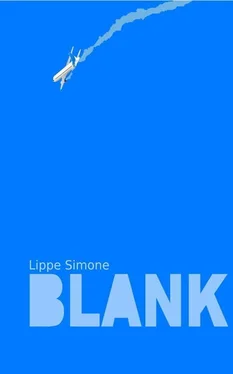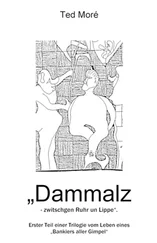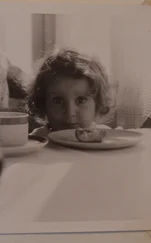To Clint’s untrained and inexperienced eye the mainland was somewhere between two and two hundred miles away. He felt sure that he could get there, assuming there was sufficient fuel, in the next ten minutes or before nightfall, whichever came last. He turned the ignition key and the engines whispered a dutiful response from somewhere deep within the boat. The accelerator accelerated and the wheel still steered the yacht and so Clint pointed toward land and waited and eventually got bored and tied off the wheel and went looking for something to drink.
Clint tried the radio and television and found no service on any channel or frequency. He reasoned that he was too far out or that the airplane crash had somehow interfered with reception or that the television and radio and ship’s radio were all broken. Eventually he contented himself with splitting his time between his duties as captain, returning to the bridge intermittently to verify that the boat was still pointed toward shore, and trying to teach Marmalade and Apricot to bring him a glass of champagne when he rang a bell. Both efforts were not entirely without success but he was more evidently effective as a ship’s captain.
And in this manner the yacht steamed quietly and confidently toward land. Clint was relieved to discover that he recognized the San Gabriel Mountains as soon as he saw them and was able to puzzle out from that piece of data that the flat, ugly, sparse spread of disconnected half-considered high-rises scattered listlessly before the mountain range must be Los Angeles. He started to notice a few other vessels on the water, mostly yachts like his own although considerably smaller. There were also sailboats and trawlers and even a sailboard but none of them were manned nor in motion. There were people on most of the boats but none of them appeared to be contributing to the functioning of the vessels which, consequently, were going nowhere.
The becalmed and drifting shipping grew considerably denser as the yacht approached shore and was joined by all manner of flotsam and jetsam and things which were neither flotsam nor jetsam, such as the floating corpses of swimmers and surfers. Clint had no recollection of ever being on the water off the coast of LA but he felt certain that this was far more than the normal number of dead bodies, even for what must be the height of the tourist season.
Clint decelerated to as slow as he could go and still steer the boat between those in the way, a maneuver which mostly amounted to ramming them and relying on the relative enormity of the yacht to tip the balance. And so it was early evening by the time Clint could begin choosing a viable mooring, in aid of which in a locker on the bridge he found binoculars the size of two coffee tins and of the sort of magnification used by professional sailors to read the mail of people several miles inland. He scanned the coast and found nothing but ideal landing points on which he could run the yacht aground and simply walk the rest of the way, an approach which appealed to his pragmatic sense of seamanship.
But as the powerful dual astronomical telescopes rushed the city into sharp focus Clint saw that just to the south, happily the direction in which the boat appeared to be currently drifting of its own accord, was a marina or docks or port or just a place where a lot of other boats felt comfortable among their own kind. He decided to allow the boat to continue pursuing its homing instincts while he did a little sight-seeing.
Sweeping the city again with no more pressing goals Clint noticed this time something amiss, something that looked too much like a postcard of Los Angeles As Seen From The Ocean. And it was just that, a picture. Clint felt sure that an early evening view of a city the size of Los Angeles should feature more traffic and sirens and people frolicking on the beach. There was nothing of the short, with a particular emphasis on the absence of frolicking. There was traffic — a great deal of traffic in fact — but it was all stopped and silent. There were no sirens although there seemed to be ample fires from which they could draw inspiration.
For as far as the powerful binoculars could reveal, which was actually slightly farther than was of any interest, there appeared to be no movement. The cars weren’t going anywhere nor honking any interest in doing so. The boats down in boatville just bobbed according to the whims of the ocean. There were no traffic helicopters or airplanes or kites. The city was clearly not as Clint had left it, although he couldn’t say for certain what it was like when he left it or if indeed it was even from Los Angeles that he’d started his day on the water.
The distance to the canal which lead to the marina was approaching a make-or-break point after which the yacht would have drifted far enough to the south to compel Clint to navigate, so he restarted the engines and very slowly engaged them and pointed toward the approximate middle of the threshold of the community of boats. The closer it was the more defined and intimidating the marina became and the slowest Clint could approach was still a breakneck two miles per hour. Though he saw no movement at all from the other vessels he rang the warning bell several times and Marmalade appeared behind him with an empty glass on a tray and a look of sincere pride of accomplishment.
The yacht slipped neatly into the mouth of the harbor, bouncing off one side of the wide river alley and then the other before swirling into Marina Del Rey. Good fortune reserved a vacant boat slip, opening its wide wooden arms directly before the yacht. Clint carefully adjusted for drift and wind, accelerated only enough to catch the rudder so that he could align the nose perfectly with the moorings, and then he crashed directly into the dock. In spite of the reduced speed the yacht continued shoreward for a good ten feet before dock and boat negotiated a standoff and the yacht was wedged securely into an evenly split boardwalk. Mission accomplished.
From the bridge Clint could see only the famous marina, a geometric and charmless parking lot of bobbing and lifeless middle class angst with names like “Serendipitous” and “Got It Maid”, bounded on three sides by weedy palm trees and stoic glass boxes pretending to be hotels and timeshares and homes for people who couldn’t bear to be too far from their boats. The water reflected the evening sunlight like a tanning mirror up into the face of the buildings and trees and neighboring boats, giving them a distinctly judgmental demeanor which Clint felt was pretty narrow-minded for a marina. None of the other boats appeared to be occupied.
Clint climbed to the front of the boat, now at about a 15° incline from the back, and took in the city from the comfort of a secure mooring. The binoculars were no longer necessary. In fact there was no need to look any further than the remaining length of dock to see that what had appeared to be a quietly comatose city hosting the world’s largest and most placid traffic jam was in fact seething with activity. And by and large it was the same activity, repeated with only variations in the participants and choice of weapons, it was street-fighting of a peculiarly factional nature.
Marina workers in their blue shirts were swinging nets and ropes in defense against an assault by deckhands dressed all in white and armed with mooring pikes and broken bottles and both sides looked equally at risk of breaking into song. Beyond that on Washington Boulevard middle-class neighbors were sacking middle-class houses and dragging one another’s wives across hedges as though lawn boundaries and topiary had lost all meaning. Clint’s guarded relationship with reality, already badly soured by events since this morning, was knocked completely from its foundations by this starkly surreal interpretation of a Los Angeles which was steeped in unfettered violence while no one was using a gun nor giving any thought to their cars. It was like a world gone mad.
Читать дальше












